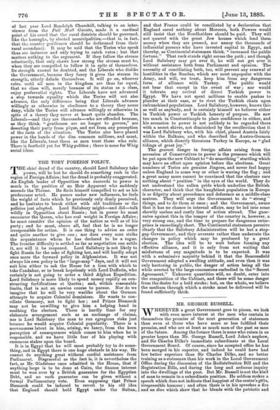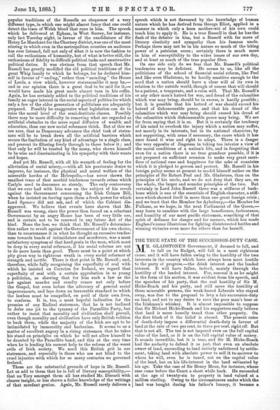MR. GEORGE RUSSELL.
WHENEVER a great Government goes to pieces, we look with even more interest at the men who contain in themselves the promise of the next generation of statesmen than even at those who have more or less fulfilled their promise, and who are at least as much men of the past as men of the future. Among the former there is none who raises in us greater hopes than Mr. George Russell, Lord John's nephew, and Sir Charles Dilke's immediate subordinate at the Local Government Board. Of course, since he accepted office he has been merged in his superior, and indeed he could have had few better superiors than Sir Charles Dilke, and no better training as a statesman than his work in the Local Government Office during the discussion of the Redistribution Bill and the Registration Bills, and during the long and arduous inquiry into the dwellings of the poor. But Mr. Russell is not the kind of man to remain in a subordinate position. He seldom makes a speech which does not indicate that happiest of the orator's gifts, irrepressible humour ; and often there is in his speeches a fire and an élan which show that he blends with the patriotic and
popular traditions of the Russells an eloquence of a very different type, in which one might almost fancy that one could detect the trace of Welsh blood that runs in him. The speech which he delivered at Egham, in West Surrey, for instance, only last Tuesday night, in favour of the candidature of Sir Henry Le Merchant for the Chertsey district, was one of the most stirring to which even in the metropolitan counties an audience has ever listened, full not only of what it is now the fashion to call the enthusiasm of humanity, but of what is better still, the enthusiasm of fidelity to difficult political tasks and unattractive political duties. It was obvious from that speech that Mr. Russell has greatly modified the old political traditions of the great Whig family to which he belongs, for he declared himself in favour of "ending," rather than "mending" the House of Lords, a view which, however statesmanlike it may be,— and in our opinion there is a great deal to be said for it,— would have made his great uncle almost tarn in his coffin. Again, he has certainly added to the political traditions of his family an eager interest in the social aspects of politics for which only a few of the elder generation of politicians are adequately prepared. Possibly he exaggerates what legislation can do to raise the moral level of the semi-destitute classes. Possibly there may be more difficulty in removing what are regarded as artificial obstacles to the more equal diffusion of wealth and education, than our new social reformers think. But of this we are sure, that as Democracy advances the chief task of statesmen will be to break down all the artificial barriers which secure the limitation of any kind of advantage to a single class, and prevent its filtering freely through to those below it ; and that only he will be trusted by the many, who shows himself to be wise and discriminating in his sympathy with their wants and hopes.
And yet Mr. Russell, with all his warmth of feeling for the alleviation of social misery,—with all his passionate desire to improve, for instance, the physical and moral welfare of the miserable hordes of the Metropolis,—has never shown the smallest trace of that morbid tenderness towards crime which Carlyle used to denounce so sternly. The only controversy that we ever had with him was on the subject of his revolt against the Government concerning the Irish Crimes Bill, when he insisted on forcing upon them a fresh power for which Lord Spencer did not ask, and of which the Cabinet disapproved. We believe that events have shown that Mr. Russell was wrong, since the power then forced on a reluctant Government by an angry House has been of very little use, and is certain not to be renewed in any future Act of the kind. None the less, we think that Mr. Russell's determination rather to revolt against the Government of his own choice, than to countenance it in what he thought an excessive tenderness towards bands of intimidators and murderers, was a most satisfactory symptom of that hard grain in the man, which must be deep in every social reformer, if his social reforms are not to do more harm than good. There must be a point at which pity gives way to righteous wrath in every social reformer of strength and mettle. There is that point in Mr. Russell ; and, therefore, while fully recognising the superfluity of zeal with which he insisted on Coercion for Ireland, we regard that superfluity of zeal with a certain approbation in so young a politician, as showing that for him such a law as the law against murder and cruelty comes not only before the Gospel, but even before the advocacy of general social improvements, and lays down an inexorable standard to which the lawless must be compelled, on peril of their own lives, to conform. It is, too, a most hopeful indication for the promise of any Radical statesman, that he is not inclined to defer one jot to the tyranny of the Parnellite Party, but rather to insist that morality and civilisation shall prevail, even though morality and civilisation have only British volition to back them, while the majority of the Irish are apt to be intimidated by immorality and barbarism. It seems to us a matter of excellent augury in a rising statesman that he takes his stand on principles on which he will not allow himself to be daunted by the Parnellite band, and this at the very time when he is lending his earnest help to the reform of the worst evils of Irish society. We need this British grit in our statesmen, and especially in those who are not blind to the cruel injustice with which for so many centuries we governed Ireland.
These are the substantial grounds of hope in Mr. Russell. Let us add to them that he is full of literary susceptibility,— that no Tory amongst them all has studied Mr. Disraeli with clearer insight, or has shown a fuller knowledge of the writings of that mordant genius. Again, Mr. Russell rarely delivers a speech which is not flavoured by the knowledge of human nature which he has derived from George Eliot, applied in a manner in which only a keen mother-wit of his own could teach him to apply it. He is a true Russell in that he has the flash of the debater in him, but a Russell with far more of literary elasticity and sympathy than his famous uncle. Perhaps there may not be in his nature so much of the biting power of a patrician scorn ; certainly there is much more in him of susceptibility to the wider issues of our own day, and at least as much of the true popular fibre.
On one side only do we fear that Mr. Russell's political tendencies may be deficient. He seems to us, like all the politicians of the school of financial social reform, like Peel and like even Gladstone, to be hardly sensitive enough to the need that a nation should have a clear will of its own in relation to the outside world, though of course that will should be a patient, a temperate, and a calm will. That Mr. Russell's or any other man's hatred for war, and dread of the calamities which war may bring, should be in excess, is hardly possible ; but it is possible that his hatred of war should exceed his hatred of dishonourable peace, and that his dread of the calamities which war may bring should exceed his dread of the calamities which dishonourable peace may bring. We are far from saying that it is so. But it is certainly the tendency of his mind to overlook the injury which a nation may suffer, not merely in its interests, but in its national character, by not supporting, with arms if necessary, the cause which it has once found it wise and right to adopt. There is a danger the very opposite of Jingoism in taking too interior a view of the moral conditions of a nation's life, and in forgetting that even for a nation there is no true grandeur possible, if it is not prepared on sufficient occasion to make very great sacrifices of national ease and happiness for the sake of countries which it is pledged to govern and protect. Mr. Russell in his foreign policy seems at present to model himself rather on the principles of Sir Robert Peel and Mr. Gladstone, than on the principles of his uncle, and we do not deny that they are, on the whole, the larger and sounder principles of the two. But certainly in Lord John Russell there was a stiffness of backbone which is one of the essentials of English character, a stiffness which showed itself in more than one great foreign crisis ; and we trust that the Member for Aylesbury,—the Member for Fulham, as we hope, in the next Parliament of the Queen,— may learn to combine with the large beneficence, forbearance, and humility of our most pacific statesmen, something of that spirit of defiance for danger and for menace, which has made England's name illustrious for fighting disinterested battles and winning victories even more for others than for herself.



































 Previous page
Previous page